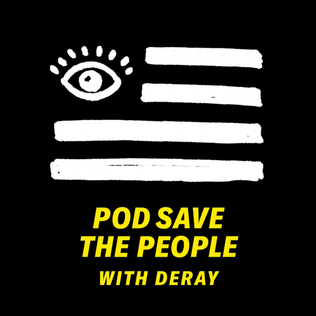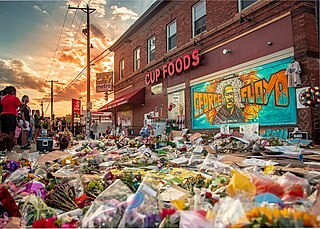
The Ferguson unrest was a series of protests and riots which began in Ferguson, Missouri on August 10, 2014, the day after the fatal shooting of Michael Brown by FPD officer Darren Wilson. The unrest sparked a vigorous debate in the United States about the relationship between law enforcement officers and Black Americans, the militarization of police, and the use-of-force law in Missouri and nationwide. Continuing activism expanded the issues by including modern-day debtors prisons, for-profit policing, and school segregation.

"Hands up, don't shoot", sometimes shortened to "hands up", is a slogan and gesture that originated after the August 9, 2014, police shooting of Michael Brown in Ferguson, Missouri, and then adopted at protests against police brutality elsewhere in the United States. The slogan implies one has their hands in the air, a common sign of submission, and is therefore not a threat to an approaching police officer. Witness reports from the Brown shooting are conflicted as to what Brown was doing with his hands when he was shot. One witness claimed Brown had his hands in the air before being killed, which was the basis for the slogan.

Black Lives Matter (BLM) is a decentralized political and social movement that seeks to highlight racism, discrimination, and racial inequality experienced by black people and to promote anti-racism. Its primary concerns are police brutality and racially motivated violence against black people. The movement began in response to the killings of Trayvon Martin, Michael Brown, Eric Garner, and Rekia Boyd, among others. BLM and its related organizations typically advocate for various policy changes related to black liberation and criminal justice reform. While there are specific organizations that label themselves "Black Lives Matter", such as the Black Lives Matter Global Network Foundation, the overall movement is a decentralized network with no formal hierarchy. As of 2021, there are about 40 chapters in the United States and Canada. The slogan "Black Lives Matter" itself has not been trademarked by any group.

DeRay Mckesson is an American civil rights activist, podcaster, and former school administrator. An early supporter of the Black Lives Matter movement, he has been active in the protests in Ferguson, Missouri, and Baltimore, Maryland and on social media outlets such as Twitter and Instagram. He has also written for HuffPost and The Guardian. Along with Johnetta Elzie, Brittany Packnett, and Samuel Sinyangwe, Mckesson launched Campaign Zero, a policy platform to end police violence. He is currently part of Crooked Media and hosts Pod Save the People.
Johnetta "Netta" Elzie is an American civil rights activist. She is one of the leaders in the activist group We The Protesters and co-edits the Ferguson protest newsletter This Is the Movement with fellow activist DeRay Mckesson.

Marissa Johnson is an activist who attained notoriety when she interrupted U.S. presidential candidate Bernie Sanders at an August 2015 rally in Seattle. Her activism has been associated with the Black Lives Matter movement. She is a founder of a Seattle-based justice group called Outside Agitators 206, which was disbanded when she became a cofounder of the Seattle chapter of Black Lives Matter around September 2015.

The 2016 Baltimore mayoral election was held November 8, 2016 concurrent with the General Election. Stephanie Rawlings-Blake, the incumbent mayor, did not run for reelection. Catherine Pugh won the election on November 8, 2016, with 57% of the popular vote, and took office on December 6, 2016.

#SayHerName is a social movement that seeks to raise awareness for Black women victims of police brutality and anti-Black violence in the United States. The movement's name was created by the African American Policy Forum (AAPF). #SayHerName aims to highlight the gender-specific ways in which Black women are disproportionately affected by fatal acts of racial injustice. In an effort to create a large social media presence alongside existing racial justice campaigns, such as #BlackLivesMatter and #BlackGirlsMatter, the AAPF coined the hashtag #SayHerName in December 2014.
Campaign Zero is an American police reform campaign launched on August 21, 2015. The plan consists of ten proposals, all of which are aimed at reducing police violence. The campaign's planning team includes Brittany Packnett, Samuel Sinyangwe, DeRay Mckesson, and Johnetta Elzie. The activists who produced the proposals did so in response to critics who asked them to make specific policy proposals. Subsequent critics of Campaign Zero and of their 8 Can't Wait project point out that some of the policies it recommends are already in place as best practice policies at many police departments. Some of these include the Milwaukee policing survey and the PRIDE act. However, a 2016 study by Campaign Zero found that only three of the eight policy recommendations were adopted by the average police department and that no law enforcement agency had adopted all eight.
Darren Seals Jr. was an American racial justice, anti-police brutality, and anti-gun violence activist from Ferguson, Missouri who worked on the assembly line at General Motors. In September 2016, he was found shot dead in a burning car. St. Louis County Police are investigating his death as a homicide; they have not publicly identified suspects or motives.

Brittany N. Packnett Cunningham is an American activist and the co-founder of Campaign Zero. She served as executive director for Teach for America in St. Louis, Missouri, then as a member of President Barack Obama's Task Force on 21st Century Policing.
Lamont Lilly is an American writer, political activist, and community organizer based in Durham, North Carolina. He is also a former vice-presidential candidate with the Workers World Party in the 2016 presidential election.
The Resistance Manual was a Wiki-style site till 2019 that crowdsourced information and resources. It was created by the activists Samuel Sinyangwe, DeRay McKesson, Johnetta Elzie, Brittany Packnett and law student Aditi Juneja. The manual includes information on policy areas such as immigration, policing, mass incarceration and disability rights, and it tracks Trump's executive orders and various controversies including Russian interference in the 2016 United States elections during the election. In the days since it was launched, the manual had over 400 pieces of content contributed to it from users, and was featured in NBC News, Huffington Post, MSNBC, International Business Times, The Fader and as one of Teen Vogue's "10 Ways to Continue The Fight for Women's Rights".

Blair Imani is an American author, historian, and activist. She identifies as queer, Black, bisexual and Muslim. She is a member of the Black Lives Matter movement, and is known for protesting the shooting of Alton Sterling and Executive Order 13769.

Pod Save the People is an American political podcast produced and distributed by Crooked Media. The show was created, and is hosted by activist DeRay Mckesson with co-hosts Kaya Henderson, De'Ara Balenger and Myles E. Johnson.
Millennial Activists United (MAU) is social justice organization in the U.S., based in Ferguson Missouri. The group works to end racism as well as police brutality in the United States.

Janaya Khan is a social activist from Toronto, Ontario, Canada. Khan is a co-founder of Black Lives Matter Toronto as well as an international ambassador for the Black Lives Matter Network. Much of their work analyzes intersectional topics including the Black Lives Matter movement, queer theory, Black feminism, and organized protest strategies.

The Black Lives Matter movement has been depicted and documented in various artistic forms and mediums including film, song, television, and the visual arts. In some instances this has taken place in the form of protest art. These cultural representations have also grown organically among artists who seek to partake in activist efforts in support or in recognition of the Black Lives Matter movement. The themes conveyed in these artistic works address the history of racism and injustice toward people of color in the United States and typically express sentiments of anger and fear as well as solace and hope.
Sandy Hudson is a Jamaican-Canadian political activist, writer from Toronto, Ontario, Canada. She is the co-founder of the Black Lives Matter movement presence in Canada.
McKesson v. Doe, 592 U.S. 1 (2020), was a decision by the U.S. Supreme Court that temporarily halted a lawsuit by a police officer against an activist associated with the Black Lives Matter movement and instructed the lower federal court to seek clarification of state law from the Louisiana Supreme Court. At issue was whether the activist, DeRay Mckesson, could be liable under Louisiana tort law for injuries caused by other people at a protest. Mckesson had argued that the First Amendment's protection of freedom of assembly should block the lawsuit entirely. The Court's decision to instead redirect the tort law issue to the Louisiana Supreme Court means that the constitutional question was delayed or avoided.












